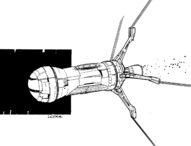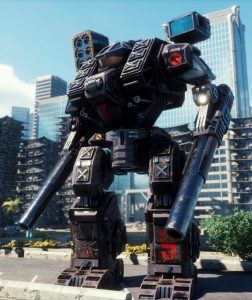Scout (JumpShip class)
- This article is about the JumpShip class. For other uses, see Scout.

| |
| Scout | |
|---|---|
| Production information | |
| Manufacturer | Alliance Aerospace Group[1]
Dharma HyperSpace[2] Ioto Galactic Enterprises[2] Irian Technologies[2] |
| Use | Exploration/Military |
| Tech Base | Star League |
| Cost | 300,000,000 C-Bills |
| Introduced | 2712 |
| Technical specifications | |
| Mass | 90,000 tons |
| Length | 273 meters |
| Sail Diameter | 890 meters |
| Fuel | 46 tons (460) |
| Burn Rate | 9.77 |
| Top Thrust | 0.2 Gs |
| Sail Integrity | 3 |
| KF Drive Integrity | 3 |
| LF Battery | None |
| Armament | None |
| Armor | 40 tons |
| DropShip Capacity | 1 |
| Crew | 18[3][4]
(Crew Types)[5]
Bay Personnel: 5[3] |
| Grav Decks | None |
| Escape Pods/Life Boats | None |
| Heat Sinks | 158 (single) |
| Structural Integrity | 1 |
| BV (1.0) | 560[7] |
Contents
Description
The Scout class is the smallest JumpShip class still in common use. Its small carrying capacity (only one DropShip) means that it is primarily used for military operations or exploration. Due to the high cost of Jumpship operation, it is generally not desirable as a commercial hauler. Another notable drawback is the lack of a Grav Deck; the Scout can only produce gravity through acceleration, which requires large amounts of fuel.
However, there are also numerous benefits to the Scout design. The first is its tiny emergence signature which is difficult to detect, making the ship ideal for reconnaissance and surprise raids.[3][8] The second is that it takes only 80% of the normal time required to quick-charge a Scout over an average-sized JumpShip. The third is that the docking collar is reinforced, allowing the Scout to thrust at 0.1 Gs acceleration even with a DropShip attached, provided that the DropShip is less than 25,000 tons in mass; without a DropShip, the Scout can accelerate at 0.2 Gs. The fourth is that the Jump Sail requires only 90% of the time to unfurl/furl compared to a larger sail and is less susceptible to rips and other forms of damage.
The Scout features up-to-date medical and recreation facilities and notably comfortable quarters for 17 crew and an additional aerospace pilot. The bridge is quite modern in comparison to larger vessels. Finally, it is equipped with backup generators that can power the life support system for three months if the main fusion power plant fails.
Armament
This vessel does not feature any weapons. It is totally dependent on its DropShip for protection. Even then, the Scout is generally better served by the Inner Sphere custom of not attacking JumpShips.
Cargo
Depending on the source material the stated cargo capacity of the Scout is wildly inconsistent, ranging from only 26 tons to well over 1000 tons (see Variants below).
The Scout has a small craft bay that can accommodate one vessel, either a small craft or alternatively an aerospace fighter.[6]
Variants
Numerous variations of the Scout have been described in various sources, with a range of different masses and cargo capacity. Although they all describe the Scout as a relatively tiny 273-meter long JumpShip with a single docking hardpoint, there are significant differences among these descriptions owing to the inconsistent, contradictory, and often erroneous application of different rulesets at different times; such discrepancies may be viewed as legacy issues from earlier rulesets when JumpShip construction rules were not yet fully fleshed out, if at all.
- 75,000 ton version with 121 heat sinks, unspecified cargo capacity (if any) (AeroTech)
- 79,000 ton version with 121 heat sinks, cargo capacity 450 tons (DropShips and JumpShips: ComStar Intelligence Summary)
- 79,000 ton version with 158 heat sinks, cargo capacity 450 tons (BattleSpace rulebook)
- 90,000 ton version with 158 heat sinks, cargo capacity 26 tons (Technical Readout: 3057)
- 90,000 ton version with 158 heat sinks, cargo capacity 100 (written) or 1,037.5 tons (stats) (Technical Readout: 3057 Revised). Under the Total Warfare ruleset this is likely the fully rules-compliant version, since it can be assumed that the 100-ton number is due to most of the 1037.5-ton cargo bay being taken up by spare parts and various supplies. Note that even then, the Scout is still equipped with 67 tons' worth of extra heat sinks that it absolutely does not need.
Earlier rules from BattleSpace stated that DropShips required one hardpoint for every 60,000 tons (or fraction thereof) of mass for docking, which meant by extension that very large DropShips were not allowed to dock with the Scout as it has only a single hardpoint. This rule was omitted in AeroTech 2, and was finally explicitly made obsolete in the TechManual rules. The Scout therefore occupies the unusual position of being one of the few JumpShips that can potentially accommodate a DropShip larger than itself.
Quetzalcoatl
One notable variant of the Scout class is the Quetzalcoatl-Scout refit that was first devised in 2786.[9] It replaces the docking collar with fighter cubicles, thereby enabling the ship to act as a fighter support carrier at the cost of its DropShip carrying capability. The first ship to undergo such a refit was the Capellan Confederation's eponymous Quetzalcoatl, after it had suffered crippling damage to its docking hardpoint in an enemy boarding attempt. The refit proved successful and several other ships have been refitted in this way. The Quetzalcoatl-subclass of the Scout is now considered a class unto its own.
See Also
Gallery
Original Scout from DropShips and JumpShips: ComStar Intelligence Summary
Scout from TRO:3057
Image of variant Quetzalcoatl from TRO:3026 revised
References
- ↑ Field Manual: 3145, p. 187: "Magistracy of Canopus"
- ↑ 2.0 2.1 2.2 DropShips and JumpShips: ComStar Intelligence Summary, p. 15: "JumpShip and DropShip Manufacturers"
- ↑ 3.0 3.1 3.2 Technical Readout: 3057 Revised, p. 92: "Scout JumpShip Profile"
- ↑ BattleSpace sourcebook, p. 51
- ↑ BattleSpace rulebook, p. 63
- ↑ 6.0 6.1 DropShips and JumpShips: ComStar Intelligence Summary, p. 17
- ↑ AeroTech 2 Record Sheets, p. 264
- ↑ Technical Readout: 3057, p. 94: "Scout"
- ↑ Master Unit List: "Quetzalcoatl-Scout JumpShip (Standard)", ("Date Introduced")





